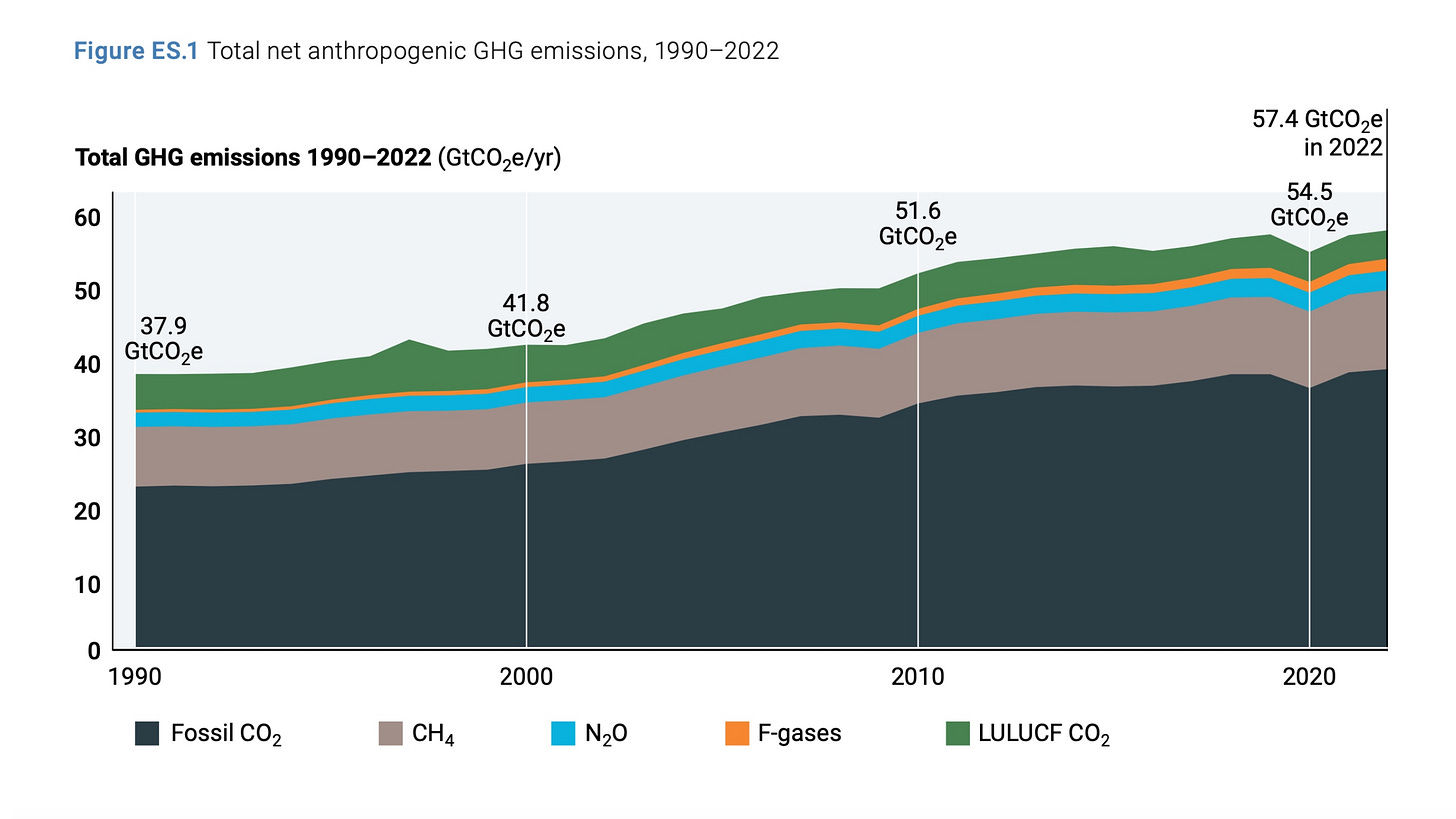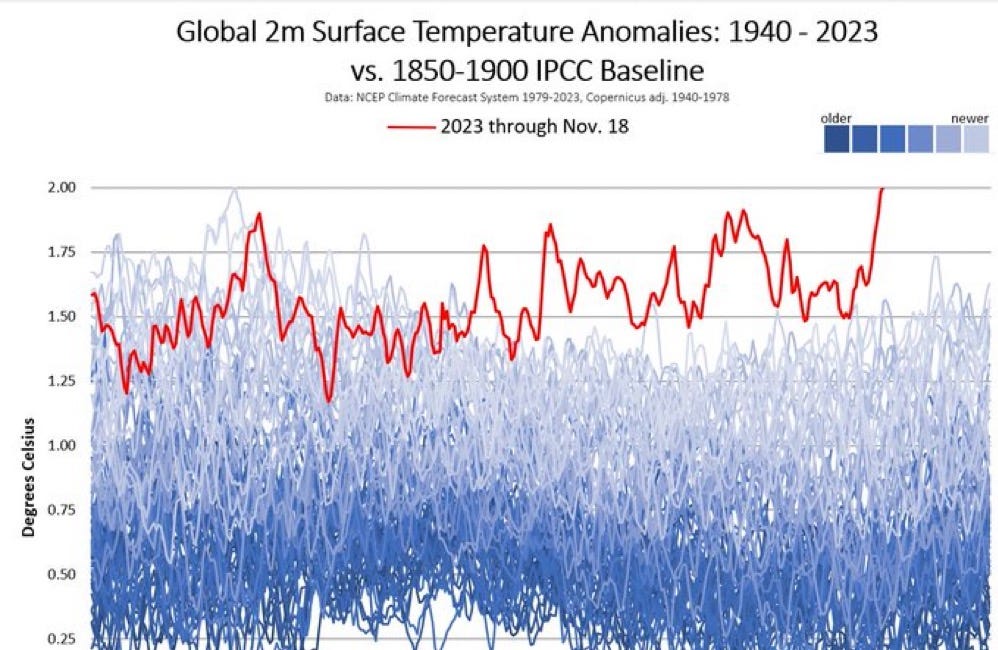This year's summary of all I wrote about climate change would likely be: higher emissions, higher temperatures, and more extreme weather, while we lack leaders in climate action.
That summary sounds like today's UN report: "Greenhouse gas emissions hit new highs, temperature records tumble, and climate impacts intensify."
The subtitle of the latest Emissions Gap Report summarizes the current challenge for the world best: "Broken Record – Temperatures hit new highs, yet world fails to cut emissions (again)."
Every year, the Emissions Gap Report tracks the gap between where global emissions are heading with current country commitments and where they ought to be to limit warming to 1.5°C.
COP28
Next week, representatives from nearly 200 countries will meet in Doha for COP28, the conference of the parties to the UN climate treaty known as UNFCCC. Every year, I see the COP number increasing. It shows that 28 years after the world decided to deal with climate change, we still haven't solved the problem. Worse: since the world started talking about solving climate change, we have collectively emitted more greenhouse gases into the atmosphere than we had when we started.
It's like entering the hospital with a broken leg, and 28 years later, somehow, both your legs are broken, and you are still in the hospital. Meanwhile, more doctors gathered around your bed, clearly disagreeing on which plaster to use and when it is considered urgent to take action. They write extensive reports and blame the lack of progress on your health on unwilling other doctors around your bed. Meanwhile, you feel your temperature rise and lose hope for a solution even though every doctor knows how to fix a broken leg.
A new GHG emissions record
While we all know that global greenhouse gas emissions should go down rapidly, they increased by 1.2 percent from 2021 to 2022. That resulted in a new record of 57.4 gigatons of CO2 equivalent, a development explaining the many climate records being broken this year, aided by the natural El Niño phenomenon.
Nearly 80 percent of historical cumulative fossil and land use, land-use change, and forestry CO2 emissions came from G20 countries, with the most extensive contributions from China, the United States of America, and the European Union, while least developed countries contributed 4 percent.
Leadership
The secretary general of the UN, António Guterres, said: "Present trends are racing our planet down a dead-end 3C temperature rise. This is a failure of leadership, a betrayal of the vulnerable, and a massive missed opportunity. Renewables have never been cheaper or more accessible. We know it is still possible to make the 1.5-degree limit a reality. It requires tearing out the poisoned root of the climate crisis: fossil fuels."
I mentioned the lack of visionary and decisive leadership in many newsletters this year. We need a kind of Winston Churchill in May 1940, a leader who dares to do the right thing even when the decision that needs to be taken is not popular.
Bravely and tirelessly reminding world leaders of their duty to lead, Guterres added: "Leaders must drastically up their game, now, with record ambition, record action, and record emissions reductions. No more greenwashing. No more foot-dragging."
The report finds that current pledges under the Paris Agreement put the world on track for a 2.5-2.9°C temperature rise above pre-industrial levels this century, pointing to the urgent need for increased climate action. The report states that to get to levels consistent with least-cost pathways limiting global warming to below 1.5°C, global GHG emissions must be reduced by 42 percent.
Carbon inequality
It rains climate reports in the weeks before a COP, and I would like to mention one more, produced by Oxfam in cooperation with several other organizations, including SEI. The report, The Great Carbon Divide, focuses on the global carbon inequality.

One of its conclusions is that the wealthiest one percent of humanity is responsible for more carbon emissions than the poorest 66 percent. I assume most readers of this newsletter won't be part of either group. That one percent consists of 77 million millionaires and billionaires; when in doubt if you are part of that group, a rule of thumb is that if your income is more than 140.000 US$ per year, you are in. This group accounted for 16 percent of all CO2 emissions in 2019, calculated to cause more than a million excess deaths due to heat.
Let me end with a few quotes from the report:
“Understanding the role of super-rich and rich people (the top 1% and 10% by income) in climate breakdown is essential if we are to successfully stabilize our planet and guarantee a good life for all of humanity.
The super-rich are key to the climate story in three ways:
through the carbon they emit in their daily lives, from their consumption, including from their yachts, private jets and their lavish lifestyles;
through their investments and shareholdings in heavily polluting industries and their vested financial interest in the economic status quo;
through the undue influence they have over the media, the economy, and politics and policy making.
As a result, they are robbing the rest of humanity of life on a healthy, liveable, and more equal planet.”
“Just as there is extreme inequality in who is responsible for the carbon emissions that have caused today's climate crisis, there is vast inequality in how its impacts are felt.”
“More than 91 percent of deaths caused by climate-related disasters of the past 50 years occurred in developing countries.”
If you got this far, please read this too:
I write this newsletter because I believe that together we can do better on this beautiful but fragile planet.
If you are a paying subscriber: thank you for your support!
If you are not, please consider supporting this initiative by taking a paid subscription.
Global Thermometer Breaks Record
It's late on a Sunday night. I shouldn't write now, but I have to share a staggering statistic: yesterday, for the first time in recorded history, the global 2m surface temperature breached 2.0 degrees Celsius above the 1850-1900 baseline. This should have been the banner headline across every major newspaper worldwide, but -no surprises here- the world didn't pay attention.
COP28 Climate Stocktake: An Alarming Reality Check
Like in any complicated process, from running a grocery store on the corner of your street to saving our planet from overheating, it is good to sometimes stop for a moment and take stock. That is what al…
Notes:
United Nations Environment Programme (2023). Executive summary. In Emissions Gap Report 2023: Broken Record –Temperatures hit new highs, yet world fails to cut emissions (again). Nairobi. https://doi.org/10.59117/20.500.11822/43922.
https://wedocs.unep.org/bitstream/handle/20.500.11822/43923/EGR2023_ESEN.pdf?sequence=10
https://makerichpolluterspay.org/climate-equality-report/









Thank you for this summary.
So much to say ... Let me just comment on that great analogy with the broken leg. I love that. It's so fitting. I don't love that that's what we're doing, but the analogy is spot on.
As Alexander mentioned in his post, the Oxfam climate report was a multiple organization effort. One of the contributors is media outlet The Guardian. Here is a link to their article about the Oxfam report.
https://www.theguardian.com/environment/2023/nov/20/richest-1-account-for-more-carbon-emissions-than-poorest-66-report-says